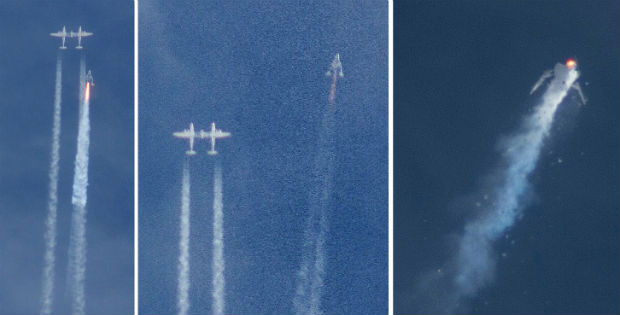
This three image combo photo shows the Virgin Galactic SpaceShipTwo rocket separating from the carrier aircraft, left, prior to it exploding in the air, right, during a test flight on Friday, Oct. 31, 2014. AP
MOJAVE, California – The loss of an experimental spaceship that broke up over the Mojave Desert, killing one pilot and seriously injuring another, has renewed criticism of the way the craft’s designer and Virgin Galactic handled a deadly explosion seven years ago.
Space enthusiasts watching Virgin Galactic’s race to send tourists on suborbital flights have complained for years about a 2007 explosion that killed three people on the ground and critically injured three others during a ground test in the development of a rocket engine for the same vehicle that crashed Friday.
“Now we’ve got another person killed, another person seriously injured. So we’ve got a lot that has hurt the industry,” said Geoff Daly, an engineer who has filed complaints with several federal agencies over the use of nitrous oxide to power the ship’s engine.
SpaceShipTwo tore apart Friday after the craft detached from the underside of its jet-powered mothership and fired its rocket engine for a test flight. Authorities have not given any indication what caused the accident. National Transportation Safety Board investigators were on the scene Sunday. The agency could take up to a year to issue a final report.
The accident was the second fiery setback for commercial space travel in less than a week. On Tuesday, an unmanned commercial supply rocket bound for the International Space Station exploded moments after liftoff in Virginia.
Daly was co-author of a critical report on the 2007 incident at Scaled Composites, the Northrop Grumman-owned designer of SpaceShipTwo. Among the report’s complaints was that the public was never given a full accounting of what went happened.
“Something is wrong here,” Daly said Sunday. “We offered to talk, give our experience. It was either ignored or totally dismissed.”
In a June 2013 letter, Daly asked the Federal Aviation Administration to put a hold on an experimental flight permit for SpaceShipTwo to ensure the safety of personnel on the ground and in the spacecraft.
“Remember, three people have been killed and numerous persons injured by a prior explosion involving (nitrous oxide) in this motor design,” he wrote as a member of a group that he said numbered about 300 people in the aerospace industry worldwide. “We do not need another incident on the ground/flight line or in the air.”
There’s no evidence from documents posted online that the FAA halted any flights for SpaceShipTwo.
Carolynne Campbell, a co-author of the report on the explosion, posted a statement on her website after Friday’s accident, saying “if the truth about the 2007 accident had come out,” the explosion that destroyed SpaceShipTwo “would probably not have happened.”
A report by the California Division of Occupational Safety and Health said the 2007 blast occurred three seconds after the start of a cold-flow test of nitrous oxide. The engine was not firing during the test at the Mojave Air and Space Port.
Whether nitrous oxide had anything to do with Friday’s disaster remains to be seen.
The nitrous oxide is used with fuel to provide propulsion. Engineers had recently changed the fuel system, switching from a rubber-based fuel to one that used plastics. The new fuel had been tested on the ground but not in flight until Friday.
During the investigation, Virgin and Scaled Composites are barred from making any comments about the accident.
“I find it slightly irresponsible that people who know nothing about what they’re saying can be saying things before the NTSB makes their comments,” billionaire Richard Branson, Virgin’s founder, said Saturday.
Burt Rutan, who founded Scaled Composites and has since retired, said it’s too early to know what went wrong, but he did not think the two accidents were connected because it appeared from photos and video that the ship’s oxidizer tank was intact.
If nitrous oxide had been to blame, “that tank would be in many pieces,” he said.